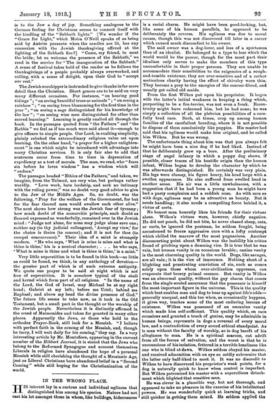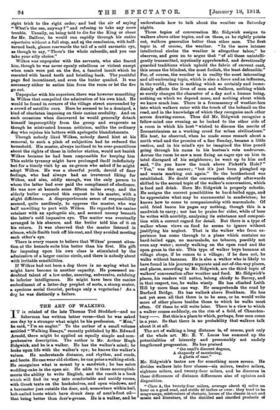IN THE WRONG PLACE. H IS interest lay in a curious
and individual ugliness that distinguished him among his species. Nature had not cast his lot amongst those in whom, like bulldogs, hideousness
is a racial charm. He might have been good-looking, but, like some of his human parallels, he appeared to be deliberately the reverse. His ugliness was due to moral causes, though this was not discovered till later in a career which caused much discomfort to his owner.
The said owner was a dog-lover, and less of a sportsman than of an idealist. He belonged to a type to lose which the world would be the poorer, though for the most part their idealism only serves to make the members of this type uncomfortable in their proper persons. They are unable to accommodate their sensibilities to the exigencies of a roughand-tumble existence, they are over-sensitive and of a rather meticulous charity having the effect of chivalry worn thin. Theybecome a prey to the energies of the coarser-fibred, and usually get called old maids.
From the first Wilkes put upon his proprietor. It beg,an with the latter's initial weakness in keeping a thing which, purporting to be a fox-terrier, was not even a freak. Eccen tricity might have redeemed him, but he had none; he was simply a collection of all the plebeian possibilities of a care fully bred race. Such, at times, crop up among human families of the carefullest breeding, where it is not possible to dispose of them conclusively like puppies. His master had said that his ugliness would make him original, and he called him Wilkes. But he was wrong.
The unfortunate thing about him was that you always felt he might have been a nice dog if he had liked. Instead of that he deliberately grew up a bore. After the preliminary stage of angel infancy in which a puppy dog shows, if possible, closer traces of his beatific origin than the human infant, Wilkes began to develop the character by which he was afterwards distinguished. He certainly was very plain. His legs were clumsy, his figure heavy, his head large with a swollen appearance. He also suffered from swelled head in another sense. His air was a little unwholesome, with a suggestion that if he had been a young man he might have had a pasty complexion and a reddish nose. As with men so with dogs, ugliness may be as attractive as beauty. But it needs handling; it also needs a compelling force behind it, a virtue of sorts.
No honest man honestly likes his friends for their virtues alone. Wilkes's virtues were, however, chiefly negative.
He did not poach, he did not bite, he never chased sheep, cats, or carts, he ignored the postman, he seldom fought, being accustomed to freeze aggressive curs with a lofty contempt which chilled the marrow of the most pugnacious. Another disconcerting point about Wilkes was the inability his critics found of pitching upon a damning vice. It is true that he was vain, but human vanity is on occasions lovable; canine vanity is the most charming quality in the world. Dogs, like savages, are all vain; it is the vice of innocence. Nothing short of a blighting and penetrating conviction of sin, such as comes solely upon those whom over-civilization oppresses, can evaporate that breezy primal essence. But vanity in Wilkes was an abnormal quality, without the gay charm that comes from the single-souled assurance that the possessor is himself the most important figure in the universe. This is the quality
which best enables man and dog to bear up against life's odds—
generally unequal, and this too when, as occasionally happens, it gives way, teaches some of the most enduring lessons of existence. Wilkes was possessed of an uncanine vanity which made him self-sufficient. This quality which, on rare occasions and granted a touch of genius, may be admirable in human beings, represents in dogs a reversal of every moral
law, and a contradiction of every sound ethical standpoint. As is man without the faculty of worship, BO is dog bereft of his
allegiance to man. He is a spiritual maroon, cut adrift from all the forces of salvation, and the worst is that he is unconscious of his isolation, fettered in a terrible loneliness like one who is blind at dawn. Wilkes seldom obeyed his master, and received admonition with an eye so coldly subversive that the latter only half-liked to meet it. It was no discredit to Wilkes to have discovered his proprietor's weak points, for a dog is naturally quick to know when control is imperfect. But Wilkes patronized his master with a supercilious detachment which blighted that sensitive man.
He was clever in a plausible way, but not thorough, and appeared to take no pleasure in the exercise of his intellectual
powers. He was wonderfully quick at learning tricks, and still quicker in getting them mixed. He seldom applied the right trick to the right order, and had the air of saying " What's the use, anyway?" and refusing to take any more trouble. Usually, on being told to die for the King or cheer for Mr. Balfour, he would run rapidly through his entire repertoire without a full stop, and at the conclusion, with half. turnedback, glance rearwards the tail of a cold sarcastic eye, as though to say, "There's the whole caboodle, and you can take your silly choice."
Wilkes was unpopular with the servants, who also feared him, though he was never openly rebellious or violent except when coals were put on the fire, a fancied insult which he resented with bared teeth and bristling back. The youthful page fled incontinent, and even the butler quailed. It was necessary either to entice him from the room or let the fire go out.
Unpopular with his superiors, there was however something in Wilkes that compelled the admiration of his own kind. He would be found in corners of the village street surrounded by a crowd of satellite curs. Here he seemed to be a demigod, a kind of charlatan imposing on their canine credulity. And on such occasions when discovered he would generally detach himself imperceptibly from the group and evaporate as though he mistrusted human criticism, unlike the ordinary dog who rejoins his betters with apologetic blandishments.
Though nobody liked Wilkes, nobody dared hint at his removal, to such a pitch of subjection had he reduced the household. His master, always inclined to be over-punctilious about the rights of those in inferior station, would not banish Wilkes because he had been responsible for keeping him This subtle tyranny might have prolonged itself indefinitely but for a timely visit by an ex-groom who asked if he might adopt Wilkes. He was a cheerful youth, devoid of finer feelings, who had always had an irreverent liking for Wilkes, and also, oddly enough, was the only person to whom the latter had ever paid the compliment of obedience. He was now at kennels some fifteen miles away, and the elderly butler reported this request to his master, with a slight diffidence. A disproportionate sense of responsibility seemed, quite needlessly, to oppress the master, who was half unwilling to part with Wilkes. He regarded his canine retainer with an apologetic air, and seemed uneasy beneath the latter's cold impassive eye. The matter was eventually arranged in his absence, and the butler told him of it on his return. It was observed that the master listened in silence, while Smith took off his coat, and they avoided meeting each other's eye.
There is every reason to believe that Wilkes' present situation at the kennels suits him better than his first. His gift for imposing upon his own class is stimulated by the admiration of a larger canine circle, and there is nobody about with irritable sensibilities.
If Wilkes had not been a dog there is no saying what he might have become in another capacity. He possessed undoubted talent of a low order, sneering, subversive, subduing to inferior intelligences. He might have been the canine embodiment of a latter-day prophet of sorts, a stump orator, a specious social theorist, perhaps only a vegetarian! As a dog he was distinctly a failure.







































 Previous page
Previous page